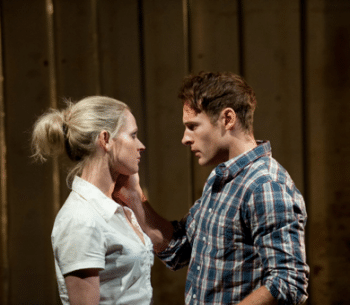Intelligent, heartfelt theatre
In this age of compassion fatigue, theatre that explores the themes of loss, grief and mother-love may not, on the face of it, seem like the sort of entertainment one would choose on a footy finals night. Moreover, a play where the title character is a career driven academic who coldly ignores her selfless husband and their child whilst engaging in an exploitative sexual affair with a young student doesn’t sound like a recipe for much, if any, joy.

However the premiere of Rhonda Is In Therapy, conceived in 2007 by Melbourne writer Bridgette Burton, the recipient of The 2009 R E Ross Trust Script Development Award, deftly manages a rare balance of humour and pathos. The result is tender and surprisingly heartrending, transcending the worthy to the more than worthwhile.
Thirty-something Rhonda, played with convincing intensity but momentary lapses of engagement by Louise Crawford, appears to have it all. She leads a successful career lecturing in chemical engineering at university, while her devoted husband Lief, in a comfortingly solid portrayal by Ben Grant, has put his own career aside to care for their four-year-old daughter. Meanwhile Rhonda attracts, and takes excessive advantage of, the voracious sexual attentions of a hunky but earnestly vulnerable student (appropriately cast in young Jamieson Caldwell). Rhonda is onto her fourth therapist in five years – she changes them regularly, as one would change moisturisers – and it is through her exchanges with the Therapist (Kelly Nash) that we learn her brittle veneer masks a numbing grief that she herself is not ready to encounter.
In a simple set by Kat Chan, the vertical bars of Rhonda’s office reflect her self-imposed emotional incarceration, while chairs and tables at either side of the stage create the imaginative spaces of her other worlds: therapy and home.
Directed by Wayne Pearn, the action moves fluidly between the spaces as Rhonda engages in dialogue with her therapist – sometimes (and hilariously) mid vigorous coitus with the student, or when negotiating her increasingly desperate home life.
The relationship with the Therapist starts in the conventional way, but when the Therapist comes to observe Rhonda in her office, hints emerge at Rhonda’s blurring of reality and fantasy. As anyone who has engaged in prolonged therapy will know, the voice of a therapist becomes internalised – this is normal, and often a sign that you are on the road to recovery – but in this case the meaning is not so clear and it is the point where play’s premise becomes really interesting. What is most important is that Rhonda knows things are really wrong, that her life cannot continue in this way, and her “choice” of therapist at this time – one who will actively challenge her – is the right one.
I took away from the play an affirmation of the courage required to realise and exorcise deeply buried trauma, and that most of the time, the impetus for this comes from inside oneself. And without giving too much away, the ending has hope, but left me in tears.
Rhonda Is In Therapy will have added resonance for anyone who has close-hand experience of the death of a child, but don’t let this put you off. It is intelligent, heartfelt theatre that speaks not only of loss, but of life.
